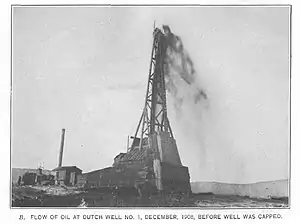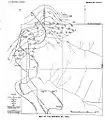
The Salt Creek Oil Field is located in Natrona County, Wyoming.[2] By 1970, more oil had been produced by this field than any other in the Rocky Mountains region and accounted for 20 percent of the total production in Wyoming.[3]
Petroleum seeps in the area were known before 1880, but oil strikes near Lander led to claims by Schoonmaker and Cy Iba.[4] In 1889 the first well to strike oil was drilled in the Shannon pool by Philip M. Shannon, president of the Pennsylvania Oil & Gas Company, who in 1895 built an oil refinery in Casper to process the oil.[5] Dr. Porro, an Italian geologist working for the Dutch company Petroleum Maatschappij Salt Creek in 1906, located the Dutch No. 1 near a large oil seep south of the Shannon wells, which was drilled in 1908.[6] The "gusher" well reached an oil sand after drilling through 1,000 feet (300 m) of shale.[7]
In 1915, a portion of the Teapot Dome was made Naval Petroleum Reserve Number 3.[8]
Geology
The field is on an anticline with 1,500 feet (460 m) of closure, which formed in the Late Cretaceous or Early Tertiary.[3] The anticline has two distinct domes, the "Salt Creek Dome" to the north and the "Teapot Dome" to the south.[9] Production is from stratigraphic traps in the Lakota, Sundance and Tensleep formations plus two Frontier Formations, which is an offshore bar sandstone, all of which are interbedded with marine shales.[3] This second Frontier formation extends into the Teapot Dome to the south.[10] The Frontier lies between the Mowry Shale and Niobrara Formation.[3]
Enhanced Oil Recovery
In the Salt Creek field, Enhanced Oil Recovery with CO2 is used to increase oil production. The CO2 is captured in a natural gas facility in the nearby LaBarge field.[14]
In 2016, CO2 was leaking from an abandoned well in the field and led to the temporary closure of a school.[15]
Notes
- ↑ Wegemann, Plate VII
- ↑ Wegemann, 1911, p. 37
- 1 2 3 4 Barlow and Haun, p. 147
- ↑ Wegemann, pp.6-7
- ↑ Wegemann, p. 7
- ↑ Wegemann, 1911, pp. 72-73
- ↑ Wegemann, 1911, p. 73
- ↑ Wegemann, p. 9
- ↑ wegemann, p. 54
- ↑ Barlow and Haun, pp. 148-149
- ↑ Wegemann, p. 13
- ↑ Wegemann, Plate III
- ↑ E/MJ, Engineering and Mining Journal (Public domain ed.). McGraw-Hill. 1896. p. 60.
- ↑ "Salt Creek EOR". zeroco2.no. Archived from the original on 2023-03-25. Retrieved 2023-09-21.
- ↑ Joyce, Stephanie (2016-11-05). "What Happened In Midwest? The Mysterious Gas Leak That Shuttered A School". Retrieved 2020-12-17.
Bibliography
- Barlow, J.A. Jr., and Haun, J.D., 1970, Regional Stratigraphy of Frontier Formation and Relation to Salt Creek Field, Wyoming, in Geology of Giant Petroleum Fields, Halbouty, M.T., editor, AAPG Memoir 14, Tulsa: American Association of Petroleum Geologists.
- Wegemann, C.H., 1911, The Lander and Salt Creek Oil Fields, Wyoming, US Dept. of the Interior USGS Bulletin 452, Washington: Government Printing Office. (Public domain ed.)
- Wegemann, C.H., 1918, The Salt Creek Oil Field, Wyoming, US Dept. of the Interior USGS Bulletin 670, Washington: Government Printing Office. (Public domain ed.)


